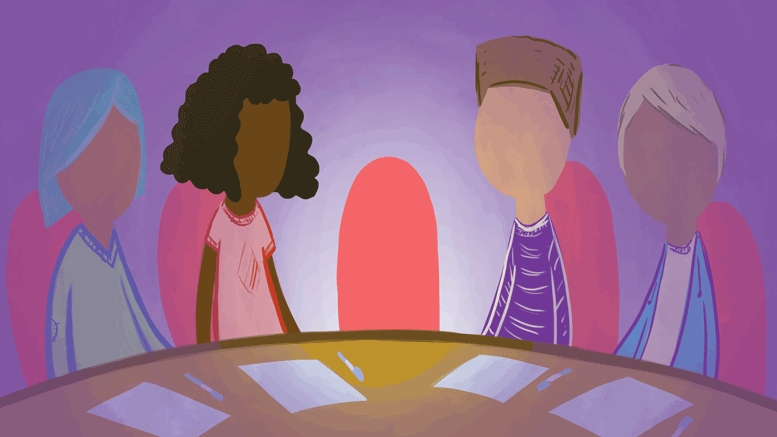Boozhoo, Waabishkigaabo nindizhinikaaz Biizu ndoodem, Wauzhushk Onigum Indoonji-baa. I am writing this article in response to there being no candidate to fill the Aboriginal student representative position on UMSU council during this year’s election. I hope to provide encouraging words for our current indigenous students who are thinking about getting involved, and for those who have no wish to be involved.
With the talk of “reconciliation,” “indigenizing the campus,” the increasing recognition that the university sits on Treaty 1 land, and more seats on councils across the university, the requisite tools and spaces are there for indigenous students to become engaged. The big question is, why are indigenous students still disengaged from campus life?
Indigenous students have the lowest turnout in elections, council events, and university events. I do not state these as fact, but as observations made by myself, indigenous colleagues, and others. This article is not meant to condemn indigenous students for not engaging, but to provide encouragement for those who feel they can’t get involved, for one reason or another.
Indigenous students make up the highest percentage of student parents in this institution. I am one of these parents. It can be difficult being away from your child; I spend the majority of my time in Winnipeg whilst my daughter is in Kenora and it is stressful and disheartening. I myself have trouble maintaining a balance, and at times consider quitting university altogether. This is one of the most common reasons I hear for why indigenous students do not get involved, and it is the most valid point I have come across. To combat this I remember that the harder I work, the more I do, the better life I can give my child in the future. Hardship always has a payoff in some way.
Secondly, students are often loaded with classes, readings, homework, and exams. This is a very good reason not to get involved, and I would never encourage others to go above and beyond in engagement if it would hurt their grades and their future. Admittedly I have missed an assignment or two, slept in and missed a class, or stayed up for 40 hours with a minimum of sleep. This is how I have chosen to engage in my university life. While it has been stressful and tiring, I can only feel like I have grown and benefited from the experience.
Coming from small-town Kenora to the “big” city was tough. I felt isolated and like I had no friends. For many indigenous students, particularly those just coming from a reserve, the university can be an intimidating place. Indigenous students that I have spoken to have felt out of place, shy, or disengaged from student life. This is an issue that those who are involved, including myself, have been trying to rectify.
I encourage indigenous students to come by Migizii Agamik. I met my closest university friends in this building, and the staff there are always supportive of new and senior students. The University of Manitoba Aboriginal Students’ Association puts on great events for indigenous and non-indigenous students to mingle and learn in a safe, inviting space. It only takes a simple “hello” to begin making new friends in this building and find ways to become engaged.
The university experience is what you want it to be: if you wish to not be involved, get your degree and leave, that is your choice. My article is not to try to sway you or put down those not involved. These are once again my experiences and observations. I just hope to provide you with encouragement and pass what little wisdom I have.
The biggest point I will try to get across is that engagement can be as much as you want it to be. I do not encourage overloading yourself with council meetings when you are bogged down by readings, homework, and class. I do not encourage attending nightly events or talks if you can’t find someone to babysit for your child or if you cannot take them with you. I can go on and on about what I do not encourage, but I will encourage you to do this: find a way to engage on what works best for you and your schedule. Something as simple as voting, which takes a maximum of 15 minutes to do, or engaging in the policy platforms of candidates that can affect your experience at this university.
If you think you can handle more than this build slowly, attend more events, join a council and see if you’d want to be an executive. It was a slow process for me; I came here not wanting to get involved, I just wanted to get my degree and leave. After a couple of events I saw the importance and the potential for the work that can be done at this university. Whether I have done anything important at all is a different story. All I know is that I tried and worked to make my university better.
Indigenous people have a unique relationship to the land the University of Manitoba sits on, and to the future generations that will walk these halls after us. Who will be the ones to hold the university, UMSU, and councils accountable as they talk about reconciliation and moving forward into a post-colonial environment? After you have left this university, what impact have you made for yourself and left for the future that follows you? The only one who can answer these questions is you. There is no guarantee that any one of us will make a change but what will we tell our future? That we didn’t try? Or will we be able to tell them truthfully that we tried, not just for ourselves, but for those generations to come?
Waabishkigaabo (Will Landon) is the outgoing Aboriginal student representative on UMSU council.



